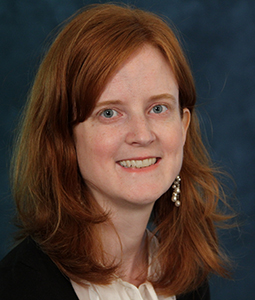 Professor Emily Cauble joined DePaul College of Law in 2012. Since then, she has become one of the law school’s top teachers and a nationally recognized tax law expert. Professor Cauble is currently researching protective tax elections and IRS letter rulings. In May 2021, she won DePaul Law's Faculty Teaching Award for her approach to remote learning during the pandemic.
Professor Emily Cauble joined DePaul College of Law in 2012. Since then, she has become one of the law school’s top teachers and a nationally recognized tax law expert. Professor Cauble is currently researching protective tax elections and IRS letter rulings. In May 2021, she won DePaul Law's Faculty Teaching Award for her approach to remote learning during the pandemic.
Q. Can you tell us about your background? What did you do prior to joining DePaul Law?
After graduating from [the University of Michigan Law School], I worked in the tax transactions group at Mayer Brown in Chicago for a several years. From there, I did a fellowship at the University of Illinois College of Law, where I had an opportunity to teach some tax classes, work on some research projects and start to develop a research agenda. After the fellowship, I taught at Michigan State University College of Law for a couple of years, and then I joined DePaul Law.
Q. How did you become interested in business and tax law?
I majored in finance and economics as an undergraduate [at the University of Notre Dame] and worked for two years between undergraduate and law school as a research assistant for the Board of Governors of the Federal Reserve in Washington, D.C. Because of my prior experience, I knew I was generally interested in doing something in the business law arena. That said, as I often tell students, it is by no means necessary to have a prior background in business in order to develop an interest in and an aptitude for business law.
My interest in tax law mainly stemmed from really liking the tax classes I took in law school. After my second year, I worked as a summer associate at Mayer Brown and had the opportunity to do some work in a variety of areas. I found the tax projects to be fascinating and really enjoyed working with the people in the tax group, so I was thrilled to have an opportunity to join them after law school.
Q. What is the focus of your current research?
One of my research projects explores the policy implications of protective tax elections. In many instances, taxpayers can select among various available tax outcomes by simply filing (or not filing) a tax election. When a taxpayer believes that filing an election may not be necessary but files it just in case, the taxpayer is filing a protective tax election.
Another project I am working on relates to letter rulings. When a taxpayer plans to undertake or has undertaken a transaction and its tax consequences are unclear, the taxpayer can request a letter ruling from the IRS. I am examining the IRS’s letter ruling practices.
Q. What are some of the biggest impacts COVID had on your areas of law?
In response to the COVID pandemic, Congress enacted numerous changes to the Internal Revenue Code. The changes include measures that provide for the economic impact payments, expand the Child Tax Credit and change the rules regarding deductions for charitable giving, just to name a few examples.
Q. In May, you won DePaul Law's Faculty Teaching Award for how you adapted to hybrid teaching during the pandemic. Can you describe some of your methods and lessons learned for remote teaching?
I separated each of the topics that I would normally cover in a course into two buckets. The first bucket included foundational material or technical material that lent itself to prerecorded videos that students could watch at their own pace and rewatch as necessary. To make the videos (hopefully) more engaging and to provide students with an opportunity to check their own understanding, I set them to periodically freeze and require students to answer a question before resuming the video. For instance, I would work through a tax problem and have the video freeze before I provided answers to several of the steps to give students an opportunity to come up with the answers themselves.
The second bucket included more involved exercises that built upon the foundational material and were more suitable for interactive discussion. We covered these exercises in real time over Zoom. These exercises might include things like working through a tax planning exercise or tackling more complicated hypotheticals in which, in addition to thinking about the tax outcome that follows from a literal application of the rules, students must anticipate how the IRS might re-characterize a transaction. I really appreciated the flexibility of the students in adapting to this new way of learning!
Q. Do you have any comments or thoughts about transitioning back to all on-campus schooling?
I am very grateful for the availability of vaccines that makes the transition back to all on-campus schooling possible! I am looking forward to seeing students and colleagues in person!